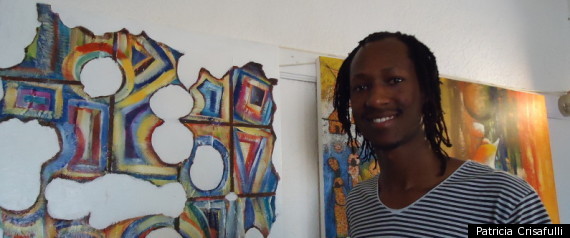
The lament of the frustrated artist often goes something like this: "If I won the lottery, then I could pursue my art." Given the proverbial one-in-a-million odds of having the winning number, though, we content ourselves with only musing about what we could be if we did not have to work for a living. I know all too well the difficulty balancing the creative that feeds my soul with the practical that pays for everything else.
It's not that I spend my days on the French Riviera, eating truffles stuffed with foie gras. But I do have a son in private college and property taxes that are the equivalent of buying a new compact car every year. My choices are neither good nor bad; there's no judgment here. But they are choices that limit the amount of time and energy I have for pure creativity.
On a recent trip to Rwanda, where I conducted research and interviews for a book I am co-authoring, I was confronted with this uncomfortable truth that shattered my excuses about why I can't give more of myself to creative pursuits. I learned this lesson in a small gallery called Ivuka Arts (www.ivukaarts.com) in the capital city of Kigali.
Tellingly, the name Ivuka means "reborn," completely appropriate for a country which continues to heal and move forward after a horrific genocide 18 years ago. In the gallery, there was no clever indirect lighting or gleaming oak floors. Instead, paintings covered plaster walls and were stacked by size and artist on the cement floor. Yet for the young Rwandan artists who work and even live at the gallery, Ivuka is sacred creative space.

We were greeted by one of the artists, Innocent Nkurunziza, a tall thin man of about 30 with short dreadlocks and a soft voice. A visual artist, he works in mixed media; for example traditional bark cloth and acrylic paint on canvas. Self-taught, he has done nothing else for a living than be an artist, which is no small feat considering that, as the first born in his family, he helps to provide for five younger brothers.
When I ask Innocent when he decided to become an artist, he grins and tells me that having discovered what he called his "unique gift," he had no choice but to pursue it. My next question strikes him as amusing, even a little ridiculous: Is it hard to be an artist in Rwanda, where there is no funding for art education, no publicly supported expositions? "It is hard to be an artist anywhere," he says. "It is a strong commitment."
Suddenly, I get it, that like the Biblical saying about the rich man's chance of getting into heaven (about as easy as threading a camel through the eye of a needle), the "stuff" that we consider the mark of a good life is a burden that impedes us from fully experiencing the creative one.
Like most people, I do not find myself in a position to quit my day job for full-time creative writing. But the uncomfortable truth of how my priorities have impacted my creativity allows me to reconsider the choices I am empowered to make. Can I say no to another client project without feeling that I'll be living on cornflakes and berries scrounged in the forest (which in suburban Chicago might be pretty hard to come by in January)? Can I turn off mindless television in order to luxuriate during evening hours writing a short story? In other words, can I live and still make my creativity a priority?
With awareness, the right choices, and some time management, of course I can.
That is what I learned in Rwanda, where the strategic plan for development says nothing about fine art. Yet Innocent does not complain. He isn't looking for anyone to make his dream come true, to provide funding, or to ease his financial burden so he can paint in peace. All he asks is for visitors to come to the gallery, where his art will speak for itself.